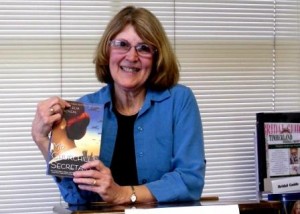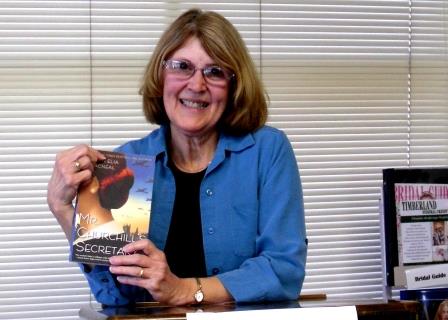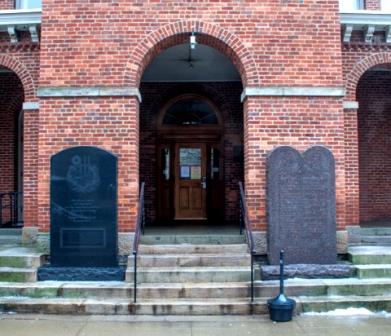
CLEARFIELD – The American Association of University Women: Books-Sandwiched-In 2014 series came to an end on March 26 at the Joseph & Elizabeth Shaw Public Library. A local resident and retired educator, Peg Barton, reviewed a historical mystery book entitled Mr. Churchill’s Secretary: a Maggie Hope Mystery.
AAUW member Gwen Crandell introduced Barton to the audience, although she acknowledged that Barton truly needed no introduction. Barton was the director at the Shaw Public Library when she first arrived in Clearfield and eventually became the elementary librarian for the Clearfield Area School District. Crandell, who was an educator herself, called Barton a good friend and colleague. She stated that Barton is her “go to person” for a suggestion of a worthwhile and entertaining read.
Barton began the presentation by recognizing those individuals responsible for the success of the 2014 BSI series: the event organizers, AAUW members who worked at each weekly program and the Shaw Public Library director and staff. According to Barton, the BSI program has been going strong since at least 1982, and the community is fortunate to have this experience.
Looking back over the past weeks of the 2014 BSI series, Barton compared it to four-course meal. She described Mary Jane Rowles’ week one presentation on the book Taylor’s Gift as the appetizer, author Dr. Edward Dionne’s week two appearance with the book Warm Hearts for Cold Noses as the soup and salad course, week three’s event by author Kenneth Womack on his piece The Restaurant at the End of the World was the entrée, and her program during the fourth and final week will be the dessert. In Barton’s opinion, there is no better book for “dessert” than a mystery.
The presenter pulled out a sign with the letters “KPO” written on it. In honor of her book’s setting and title, Barton utilized the familiar “keep plodding on” phrase from Winston Churchill to engage her audience.
Since reading her first Nancy Drew novel, Barton shared that she has always loved mystery books. She has a particular fondness for a great historical mystery series because the story line offers a sense of history with the setting, and she enjoys the combination of fiction interspersed with reality. She finds this genre often guides her to conduct research on a particular time period or individual.
Mr. Churchill’s Secretary was published in 2012 by American author Susan Elia MacNeal. According to Barton, this was MacNeal’s first novel, although she had been writing magazine articles for years. Mr. Churchill’s Secretary is the first book of the Maggie Hope series. There are currently three titles available, and the fourth volume is due for release in July.
The novel, according to Barton’s summary, is set in the year 1940 in London. At this time in history, World War II has been going on for a year and Winston Churchill had just been sworn in as prime minister. The British people are in the midst of preparing themselves for what will be known as the Blitz. The main character is Maggie Hope; although she is British, she was raised in the United States from an early age. Maggie was orphaned and raised by her aunt. She knows little of her parents except that they had been killed in a car accident.
Maggie, like her father before her, has a love of puzzles and numbers. She graduated from Wellesley College with a degree in mathematics and planned to attend MIT to pursue her doctorate in mathematics. At this time in history, this was a huge accomplishment, but Maggie was unable to accept. With her grandmother’s death, Maggie is left a house in London and must move there to take possession.
As the war hits England, Maggie is determined to do her part. She is living in her grandmother’s home with four other women. With her degree in mathematics and her analytical mind, Maggie applies for a job as a private secretary on Churchill’s staff. Though highly qualified for the position, she does not obtain a job that is generally awarded to men.
Maggie is eventually called by David, a friend who works in Churchill’s office, to be a typist on staff. Maggie was disappointed by this offer because she knows she can do more but chooses to accept due to David’s assurance that “working for Mr. Churchill would be one of the hardest and most challenging jobs you can do.”
According to Barton, Maggie finds the work for Churchill in the War Room to be exhilarating, challenging and overwhelming. She mentioned that the typists were to use a special typewriter to prevent the clicking noise that disturbed Churchill.
At this point in the book, Maggie visits the gravesites of her parents. To her surprise and bewilderment, she encounters only one grave – her mother’s. A groundskeeper informs her that, until recently, the grave was frequented by a gentleman paying his respects.
Maggie now faces a series of questions: why is there no grave for her father, who is the gentleman who visited her mother’s grave, and why did her aunt lie to her for years? What she is unaware of, however, is that a number of powerful men hope that she is unable to solve this mystery.
Another puzzle begins to plague Maggie, as she discovers a clothing advertisement in the newspaper. Barton states that it is not the style of dress but a series of dots and dashes that got Maggie’s attention, and she believes there is a message encoded in the advertisement.
Barton leaves the audience with a few questions of her own: Will Maggie solve the puzzle, if there is one? Is there a plot that could bring down England? Can Maggie make a difference? Much to the dismay of the audience, Barton left these questions hanging and encouraged everyone to find out for themselves.
As mentioned previously, historical fiction often inspires Barton to do research on her own. In the presentation, she described a portion of the book in which people took refuge from bombings inside Anderson shelters in their backyard.
Barton was intrigued to know more and informed the audience that these shelters were made of steel, placed in pits dug into the yard and covered with dirt. They were not very big, and Barton wondered what it felt like to have an entire family huddled inside for safety.
Barton’s presentation concluded with author interviews and quotes. She stated that MacNeal was inspired to write this series after a visit to the Cabinet War Rooms in London. During a tour, MacNeal heard a memoir of a typist who had worked as Churchill’s secretary.
A first draft of the novel was rejected by multiple publishing companies. Comments from some kind editors helped MacNeal to realize the characters and setting were phenomenal, but nothing really happened in the story. A friend sent her a piece about Nazi code that was hidden in women’s clothing advertisements, and MacNeal had her story. She rewrote most of the book and created the Maggie Hope series.
Finally, Barton stated that what most attracted her to Mr. Churchill’s Secretary is the strong female character of Maggie Hope. She quoted MacNeal as saying, “I wanted to write about the people who worked in the War Room, ‘ordinary people doing extraordinary things.’ I wanted to write about the civilians. I especially wanted to write about the women of that time, because there was a huge sea of change going on with women and their work outside the home, and how women’s contributions were seen by society.” Barton echoed this sentiment by saying that, especially during Woman’s History Month, “Maggie Hope is a fine fictional representative for the women who stepped out, paving the way and refusing to step back and resume that traditional woman’s role when the men came marching home.”
The program concluded with Crandell reminding the audience to mark their calendars for March of next year when the Books-Sandwiched-In program resumes. She also stated that if anyone has any book suggestions for presentations, they should contact an AAUW member.
Mr. Churchill’s Secretary: a Maggie Hope Mystery will soon be available for checkout or hold at Shaw Public Library. The library is open Mondays, Wednesdays, and Saturdays from 10 a.m. until 5 p.m., Tuesdays and Thursdays from 10 a.m. until 9 p.m., and Fridays from 12 p.m. until 5 p.m. Additional information may also be found on the Web site at http://www.clearfield.org/shaw.




